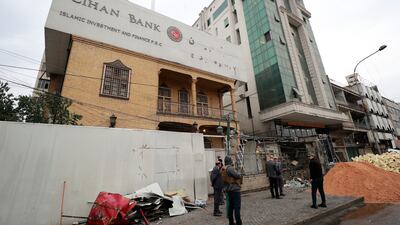Two people were hurt as two explosions rocked Baghdad late on Sunday in the latest in a series of politically-motivated attacks.
The bombs simultaneously went off at two branches of privately-owned banks in Baghdad’s Karrada neighbourhood, the government said.
The Cihan Bank and the Kurdistan Bank are owned by Kurdish businessmen.
State authorities said they would arrest those who planned and carried out the “cowardly attacks that aim to disturb security and stability".
Iraqi President Barham Salih, a Kurd, denounced the attacks as “criminal and terrorist acts threatening the stability and security".
The timing of the attacks “is suspicious”, Mr Salih said.
The attacks came amid a tense political and security atmosphere in the country. Political rivals have been at loggerheads over the formation of the new government.
On Saturday, gunmen threw a hand grenade into the office of a Sunni politician in Baghdad’s south-western neighbourhood of Sayyidiyah.
Abdul-Karim Abtan Al Jubouri, who is affiliated to the Taqadum party led by Parliament Speaker Mohammed Al Halbousi, was not at his office and no casualties were reported.
Shortly before dawn on Friday, militants on motorcycles attacked the offices of the Taqadum and the Azim coalition headed by tycoon Khamis Al Khanjar.
In all three attacks, the buildings suffered only minor damage.
Since October's national elections, the divide has widened among the country's political rivals, mainly Shiites who make up the majority.
The Sadrist bloc, a political group led by populist Shiite cleric Moqtada Al Sadr, emerged as the biggest group, with 73 seats.
There was an unsuccessful challenge of the election result by pro-Iran groups that suffered a major blow in the vote.
They were further angered when one of the main Kurdish parties, the Kurdistan Democratic Party, and the two major Sunni parties joined forces with Mr Al Sadr to form the new government.
Threats have been issued against Kurds and Sunnis.
Mr Al Sadr is willing to form a majority government, excluding some of his rivals.










